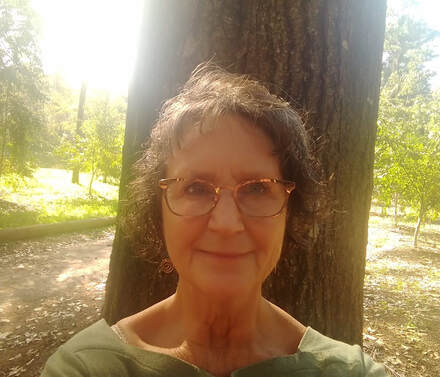Rebecca Spears
Rebecca A. Spears, author of Brook the Divide: Poems (Unsolicited Press, 2020) and The Bright Obvious: Poems (Finishing Line Press, 2009), has her poems, essays, and reviews included in TriQuarterly, Calyx, Crazyhorse, Barrow Street, Verse Daily, Ars Medica, Field Notes, and other journals and anthologies. She has received awards from the Taos Writers Workshop, Vermont Studio Center, and Dairy Hollow House. Brook the Divide was shortlisted for Best First Book of Poetry (Texas Institute of Letters). Spears is also a Pushcart nominee.
Excerpt from Rebecca's essay “Breath,” from R.kv.r.y:
My grandfather sleeps in my room, a pale blue room with organdy curtains and oak floors. On warm days, the window is opened to let in the breezes. Near the crib where I sleep, there’s a roll-away bed against one wall. This is Granddad’s bed.
I do not know how long he lives in my room, but he must’ve stayed a while. Why do my parents invite him to stay? They are soft-hearted; they never shirk obligations; they honor their parents. Maybe he’s homeless. In photos, he looks frail. Maybe he’s in poor health because he is an alcoholic. Alcoholics, with their compromised immune systems, are at high-risk for contracting TB. Granddad looks kindly, benign, but when he comes to live with us, he is deadly. He has active TB, though my parents do not know that right away. At some level, maybe he knows he is ill, but he doesn’t know what the illness is, or the consequences.
Some years ago, my daughter Claire brought home from school a paper with creatures on it in black outline. Round creatures with thin arms and legs. She’d colored the forms in primary colors and green.
–Tell me about these, I said.
–They’re snot-boys, she replied, wide-eyed, smiling, triumphal.
–Snot-boys?
–Yeah. You gotta wash your hands or you’ll get a cold.
–Oh, germs!
–Yeah, germs!
The protocols derived from germ theory are pragmatic, they work: wash your hands, cover your cough or sneeze, and wash your hands again, disinfect surfaces, air out rooms, don’t drink after others, repeat the hand-washing once more. The year many of us prepared for the swine flu pandemic I taught in a large, urban high school in Houston. The administration held more than one meeting about expected outbreaks, and put into effect some simple measures. Remind students to wash their hands, to sneeze into the crook of an arm, to stay home if they were ill. Then we teachers were handed over-sized bottles of hand sanitizer and a box or two of Kleenex.
My grandfather sleeps in my room, a pale blue room with organdy curtains and oak floors. On warm days, the window is opened to let in the breezes. Near the crib where I sleep, there’s a roll-away bed against one wall. This is Granddad’s bed.
I do not know how long he lives in my room, but he must’ve stayed a while. Why do my parents invite him to stay? They are soft-hearted; they never shirk obligations; they honor their parents. Maybe he’s homeless. In photos, he looks frail. Maybe he’s in poor health because he is an alcoholic. Alcoholics, with their compromised immune systems, are at high-risk for contracting TB. Granddad looks kindly, benign, but when he comes to live with us, he is deadly. He has active TB, though my parents do not know that right away. At some level, maybe he knows he is ill, but he doesn’t know what the illness is, or the consequences.
Some years ago, my daughter Claire brought home from school a paper with creatures on it in black outline. Round creatures with thin arms and legs. She’d colored the forms in primary colors and green.
–Tell me about these, I said.
–They’re snot-boys, she replied, wide-eyed, smiling, triumphal.
–Snot-boys?
–Yeah. You gotta wash your hands or you’ll get a cold.
–Oh, germs!
–Yeah, germs!
The protocols derived from germ theory are pragmatic, they work: wash your hands, cover your cough or sneeze, and wash your hands again, disinfect surfaces, air out rooms, don’t drink after others, repeat the hand-washing once more. The year many of us prepared for the swine flu pandemic I taught in a large, urban high school in Houston. The administration held more than one meeting about expected outbreaks, and put into effect some simple measures. Remind students to wash their hands, to sneeze into the crook of an arm, to stay home if they were ill. Then we teachers were handed over-sized bottles of hand sanitizer and a box or two of Kleenex.

